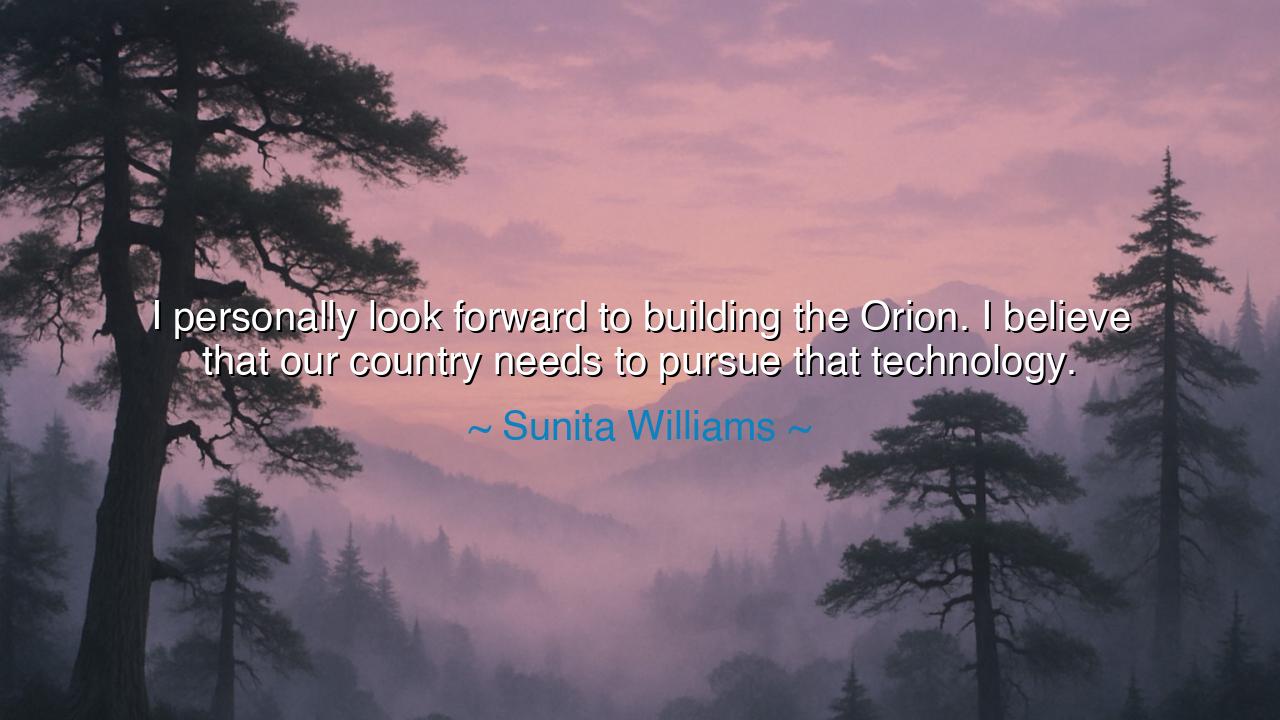
I personally look forward to building the Orion. I believe that
I personally look forward to building the Orion. I believe that our country needs to pursue that technology.






Sunita Williams, a voyager among the stars, speaks with the steady fire of a pioneer when she declares: “I personally look forward to building the Orion. I believe that our country needs to pursue that technology.” These are not idle words, but a torch held aloft for future generations. In them we hear both personal devotion and national calling, both the yearning of an individual heart and the destiny of a people. For the Orion spacecraft is more than a vessel of steel and circuitry—it is a symbol of mankind’s unbroken desire to press beyond the boundaries of Earth.
The Orion was born in the crucible of vision, a craft designed to carry humans farther than ever before, into deep space and toward Mars itself. Williams, an astronaut who has spent months dwelling in the silence of orbit, knows the power of such a ship. To her, it is not merely metal, but a chariot of possibility, a bridge between what is and what might be. Just as the sailors of old gazed upon the horizon and longed for ships strong enough to brave unknown seas, so does she look upon Orion as the ark of a new era.
Her words echo the spirit of the Apollo missions, when men first stepped upon the Moon. Then too, it was not only science that propelled them, but the belief that a nation must strive, must push, must refuse to stagnate. The Cold War rivalry lit the fire, but the achievement outlasted the fear. So too, Williams reminds us that pursuing technology is not a luxury but a necessity. A country that ceases to strive ceases to grow; a people that turns away from the frontier turns also away from its own greatness.
History is filled with examples of this truth. Consider the Age of Discovery, when Spain and Portugal sent ships into uncharted waters. It was costly, dangerous, and uncertain, but it yielded a new world. Had they hesitated, others would have seized the moment, and history would have been written differently. So too with space: if we do not build, if we do not pursue, others will take the mantle of exploration, and we shall be left as spectators rather than authors of the future.
And yet, Williams speaks not only as a patriot, but as a human being. Her words—“I personally look forward”—reveal the deep yearning within every soul to be part of something larger than itself. Each of us, in our own way, builds our “Orion,” whether it be a ship of space, a work of art, a family, or a vision for our community. The desire to create, to push boundaries, to prepare a vessel that carries hope into the unknown—this is a universal calling, not reserved for astronauts alone.
But let us not mistake her message: the building of technology is not the end, but the means. Orion is not merely about metal, engines, or rockets. It is about endurance, vision, and faith in the generations to come. It is about daring to say, “we are not finished; the stars are still ahead.” For if humanity ceases to dream, if it ceases to pursue, it becomes no more than dust bound to Earth.
Therefore, O listener, take this lesson: pursue your Orion, whatever form it takes. Do not fear the vastness of the unknown, for greatness is forged in the pursuit of it. Build not only for yourself, but for your people, your children, and those who will walk the path after you. Whether you wield the tools of science, art, or service, build with courage, build with vision, build with love. For it is in this pursuit that humanity ascends beyond survival into meaning.
In the end, Williams’ words remind us of the eternal truth: a nation, and indeed a people, must always move forward, lest they fall into decay. To pursue new technology, to seek new frontiers, is not only survival—it is destiny. And so, like her, let us look forward with hearts alight, ready to build our Orion, and through it, touch the stars.






AAdministratorAdministrator
Welcome, honored guests. Please leave a comment, we will respond soon